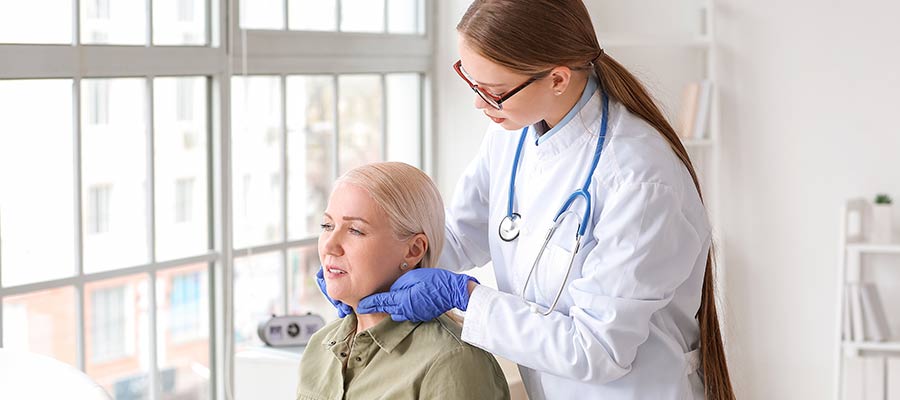Hypothyroidism vs. Hyperthyroidism: What’s the Difference?
Hypothyroidism and hyperthyroidism are two common medical conditions resulting from improper levels of thyroid hormone produced by your body. Visit The Center for Occupational and Environmental Medicine (COEM) to get specialized and comprehensive. For more information, contact us today or schedule an appointment online. We are conveniently located at 7510 North Forest Drive North Charleston, SC 29420.


Table of Contents:
What is hypothyroidism?
What is hyperthyroidism?
Differences between hypothyroidism and hyperthyroidism
What causes thyroid issues?
What are the symptoms?
Is TSH the only component of thyroid that matters?
How can you treat thyroid conditions?
Thyroid hormone is critical for the proper functioning of almost every tissue in the body. Thyroid hormone affects heart rate, body temperature, body weight, and cholesterol metabolism. It influences oxygen utilization, transit time through the GI tract is critical for growth and development, and even our emotional state.
Thyroid hormones are made by the thyroid gland which is located in the front of our neck. A feedback mechanism exists to keep the level of the hormones within an appropriate range. The brain monitors the hormone levels in the blood. The pituitary gland releases thyroid stimulating hormone, which does exactly what its name suggests, it stimulates the thyroid gland to produce thyroid hormones. If the brain thinks that the hormone levels are too low in the blood, it will produce more of this thyroid-stimulating hormone (TSH), which then stimulates the gland to make more hormones. Conversely, if the brain feels the levels are too high in the blood, the pituitary will make less TSH. This will then slow the thyroid gland’s production of thyroid hormones.
It is estimated that over 20 million people in the United States suffer from thyroid disease.
Hypothyroidism is also known as an underactive thyroid. It occurs when your thyroid gland does not make a sufficient amount of thyroid hormones to meet your body’s needs. This leads to a slowdown of your body’s functions. It is estimated that 80% of thyroid disorders are due to Hypothyroidism.
Hyperthyroidism or overactive thyroid occurs when the thyroid gland makes excess thyroid hormones than what your body needs. If left untreated, it can cause serious problems with the bones, heart, muscles, menstrual cycle, and even fertility.
The most significant difference between these two dysfunctions lies in the level of thyroid hormone in your blood. Hypothyroidism usually shows symptoms such as slowed metabolism, weight gain, depression, and tiredness. Whereas hyperthyroidism gives you more energy and you may experience weight loss and feel anxious often.
Thyroid conditions are mostly caused by iodine deficiency, chronic stress, toxicity buildup, and different autoimmune conditions. Autoimmune diseases like Grave’s disease can lead to hyperthyroidism. In addition, toxic adenomas and subacute thyroiditis can also increase your thyroid hormone production and cause you to develop hyperthyroidism.
Acute exposure to mold and other toxins has been shown to adversely affect thyroid levels as well.
On the other hand, hypothyroidism is often triggered by conditions like Hashimoto’s thyroiditis that reduce the production of thyroid hormone in your body.
Also Read – Thyroid Disease: Do You Have a Scalloped Tongue?
The symptoms can vary depending on your thyroid condition. If you are suffering from hypothyroidism, you usually feel sluggish, have dry hair and skin, are sensitive to cold, have trouble concentrating, experience muscle cramps and pains, and are prone to fluid retention. Whereas with hyperthyroidism, you may experience unexplained weight loss, rapid heart rate, irritability, trouble sleeping, anxiety, and sensitivity to heat.
By measuring a blood level of TSH (Thyroid Stimulating Hormone), one can get an idea as to whether or not the brain is “happy” with the levels of thyroid hormone that it is seeing in the blood.
Controversy exists over what the optimal level of TSH is. To make it even more confusing, TSH production has a circadian rhythm and is naturally low at certain times of the day versus others.
People seem to feel their best when their TSH level between 0.4-2.0 uIU/ml, although LabCorp’s reference range is 0.4-4.5 and other labs may even use other different ranges than that as well. Clinical experience shows that people begin exhibiting signs of hypothyroidism when their TSH is above 2.0, however, conventionally this is often missed because of the current reference ranges generally accepted.
Thyroid hormones include multiple components which can be measured as:
• Triiodothyronine (T3)
• Triiodothyronine (T3) Free
• Thyroxine (T4)
• Thyroxine (T4) Free
• Reverse T3
• Total T3/Reverse T3 Ratio
To try to access whether thyroid function is truly optimal, it is very important to take clinical signs and symptoms into consideration. If someone has symptoms such as the inability to lose weight, inappropriate hair loss, and fatigue, and they happen to be wearing a sweater in July, it is suspicious for hypothyroidism almost regardless of what the labs say.
The best way to treat thyroid conditions is to have regular six months follow-ups and laboratory work to ensure optimal levels of thyroid in the blood.
• Treat the root cause of the disease
• Take thyroid hormones, if required by a physician whose care you are under Treatment can include taking synthetic thyroid, often known as Levothyroxine, or utilizing natural thyroid, often known as Armour Thyroid or Nature-Throid. The primary difference is that Natural Thyroid contains both T3 and T4 while synthetic thyroid only contains T4 which is then converted by the body utilizing a key enzyme into T3. In some patients, these enzymes are not present at high enough levels or are not working properly.
• Exercise
• Ensure proper nutrition
• Minimize stress
• Heat therapy
• Supplement your diet
If you are looking for a thyroid treatment doctor to assess and treat your thyroid disease, you can contact us today or schedule an appointment with our experts online. We are conveniently located at 7510 North Forest Drive North Charleston, SC 29420. We serve patients from Charleston SC, Mount Pleasant SC, Summerville SC, North Charleston SC, Goose Creek SC, Ladson SC, Hanahan SC, James Island SC, John’s Island SC, Daniel Island SC, West Ashley SC, Moncks Corner SC, Sullivans Island SC, Folly Beach SC, Isle of Palms SC and all of South Carolina, Nationally, and Internationally. Patients routinely fly into Charleston to be evaluated by COEM and to enjoy this beautiful city, which is a Condé Nast and Travel and Leisure Top Domestic and International Tourist Destination.










